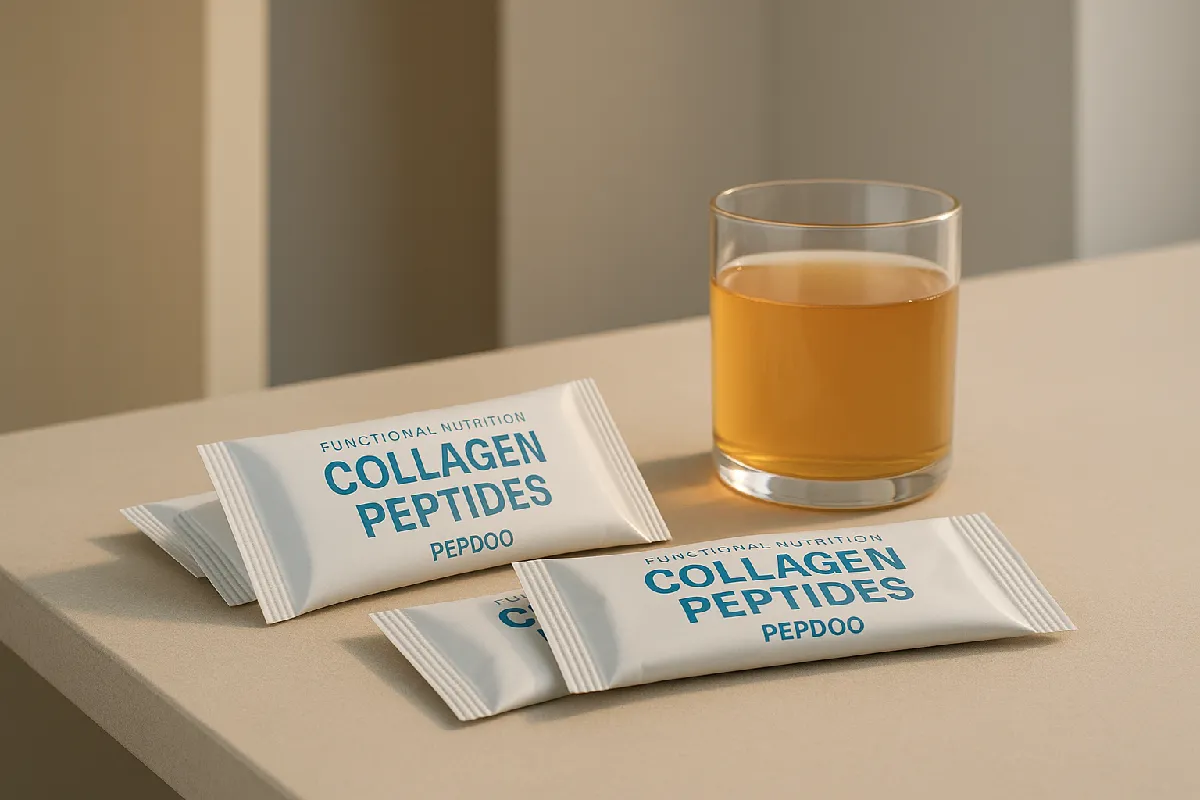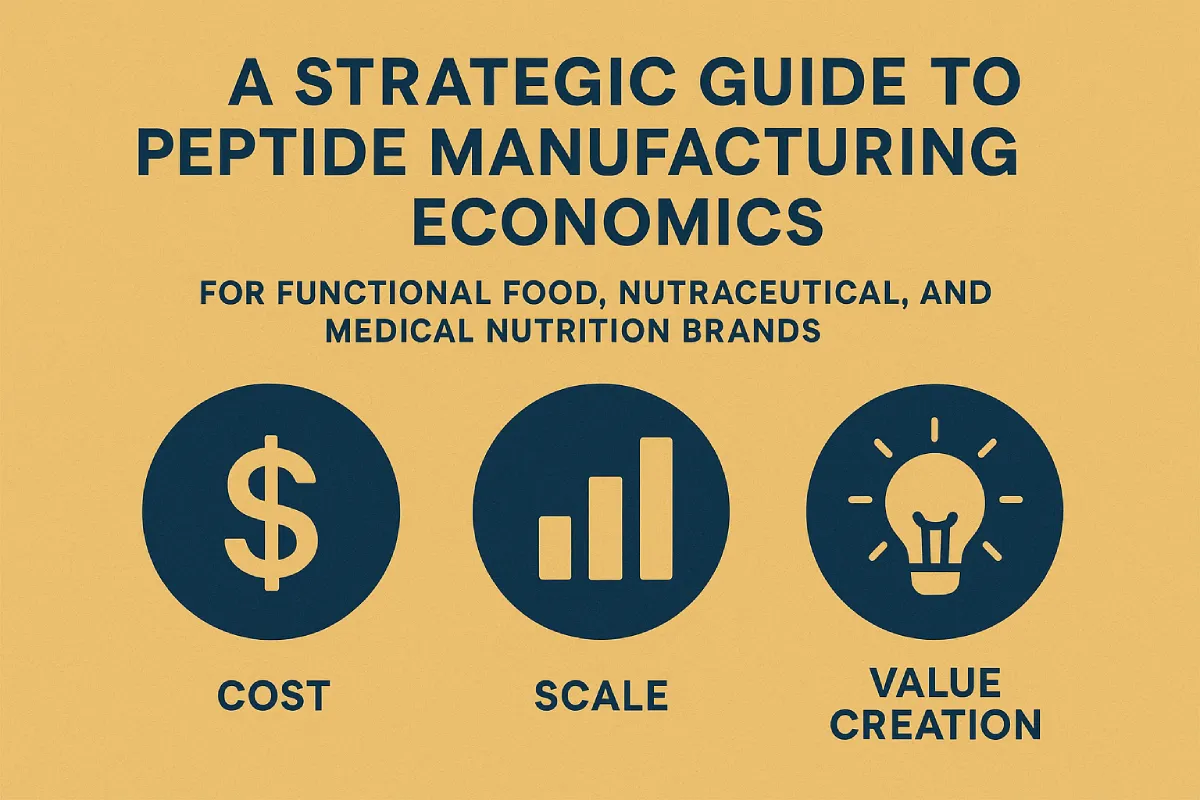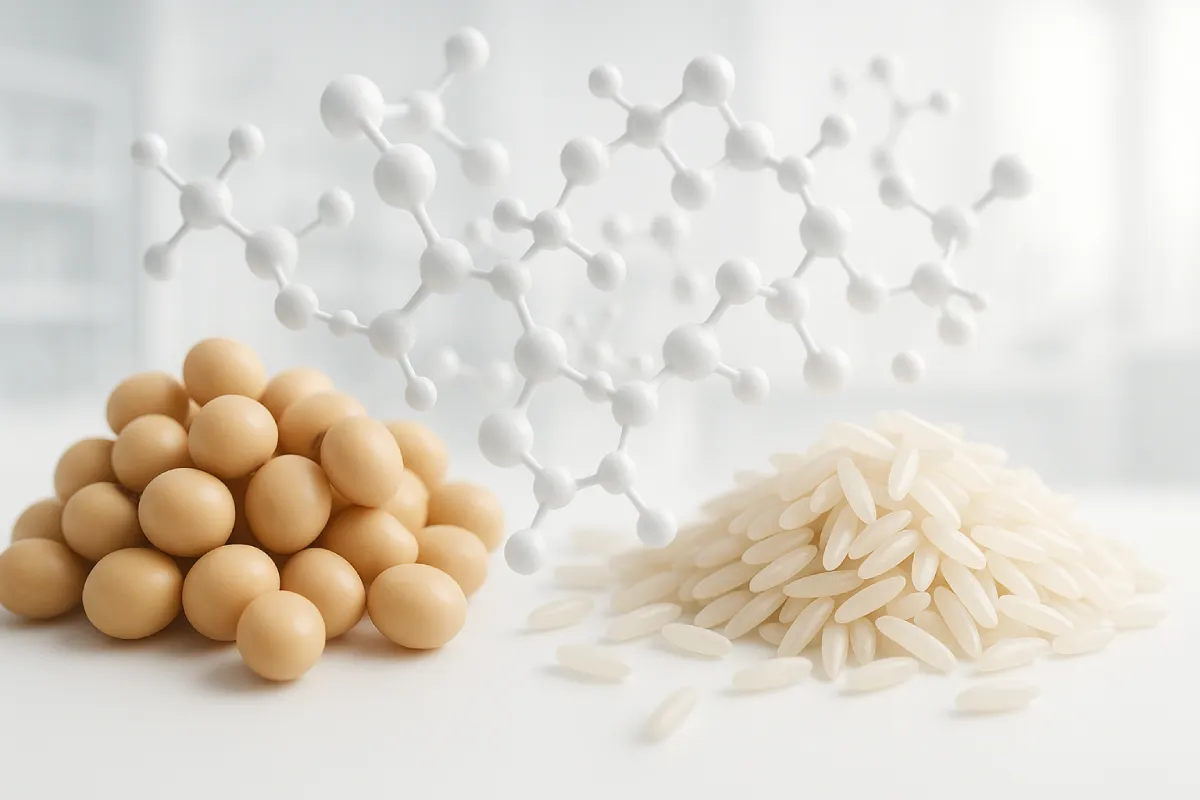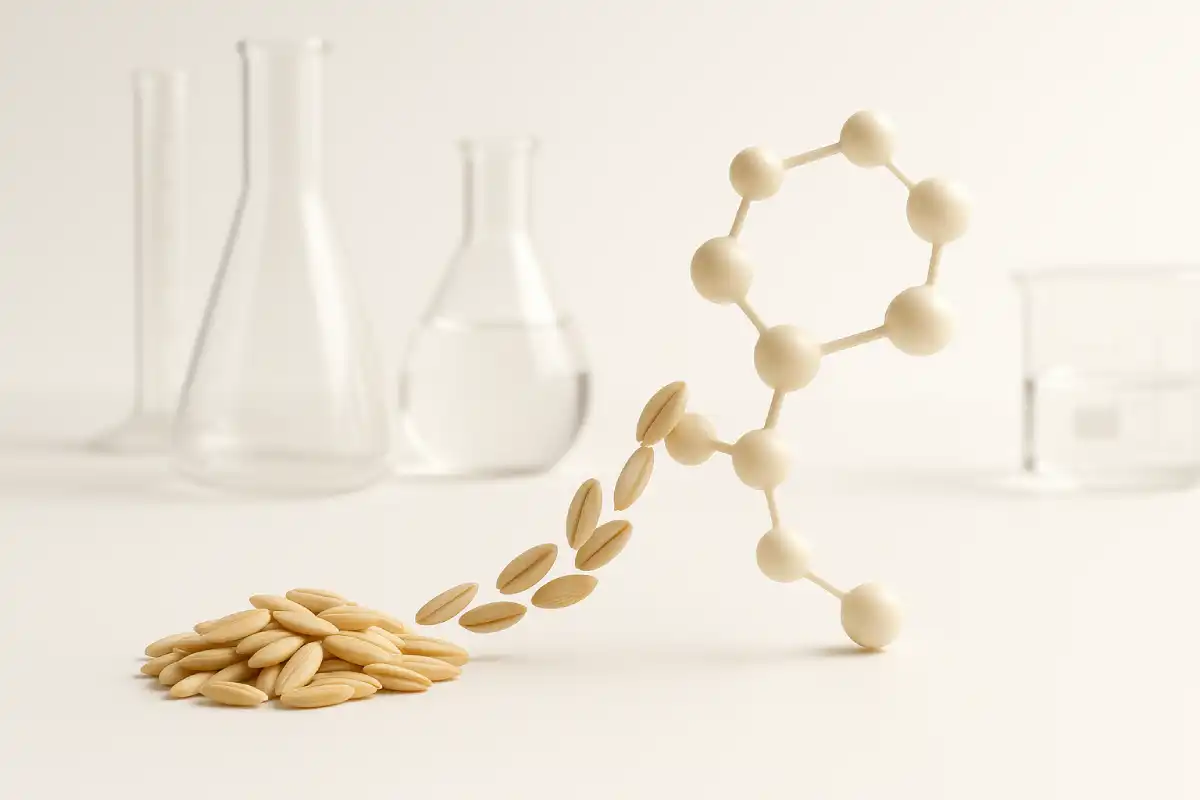The Rising Demand for Women’s Health Solutions
The global women’s health market is undergoing unprecedented growth. Valued at approximately USD 44.6 billion in 2024, it is projected to reach USD 69.5 billion by 2034, reflecting a compound annual growth rate (CAGR) of 4.7% ([1]). This expansion is fueled by increased awareness of women’s unique health needs, the aging population, and a growing emphasis on preventive care through functional nutrition. For B2B brands in the functional foods, dietary supplements, and special medical foods sectors, this represents a strategic opportunity to develop differentiated offerings that address skin health, metabolic support, hormonal balance, and cognitive wellness.
Peptides, defined as short chains of amino acids with biological activity, are gaining attention as key functional ingredients in women’s health products. Their versatility allows them to be integrated into a wide range of formulations, from collagen-based skin supplements to metabolic-support nutraceuticals. Importantly, peptides offer high bioavailability and measurable physiological effects, making them highly attractive to B2B brands seeking scientifically validated ingredients ([2]).
PEPDOO® exemplifies leadership in this domain. As a full-range peptide manufacturer, PEPDOO® supplies B2B partners with a comprehensive portfolio of functional peptides, including collagen peptides, plant-based peptides, elastin peptides, and bioactive small-molecule peptides. PEPDOO® is also a standard-setter in the Chinese peptide industry, holding numerous patents in small-molecule peptides and employing internationally advanced peptide production technologies. For B2B clients, these capabilities translate into reliable, innovative, and customizable raw materials that can support new product development and enhance market differentiation.
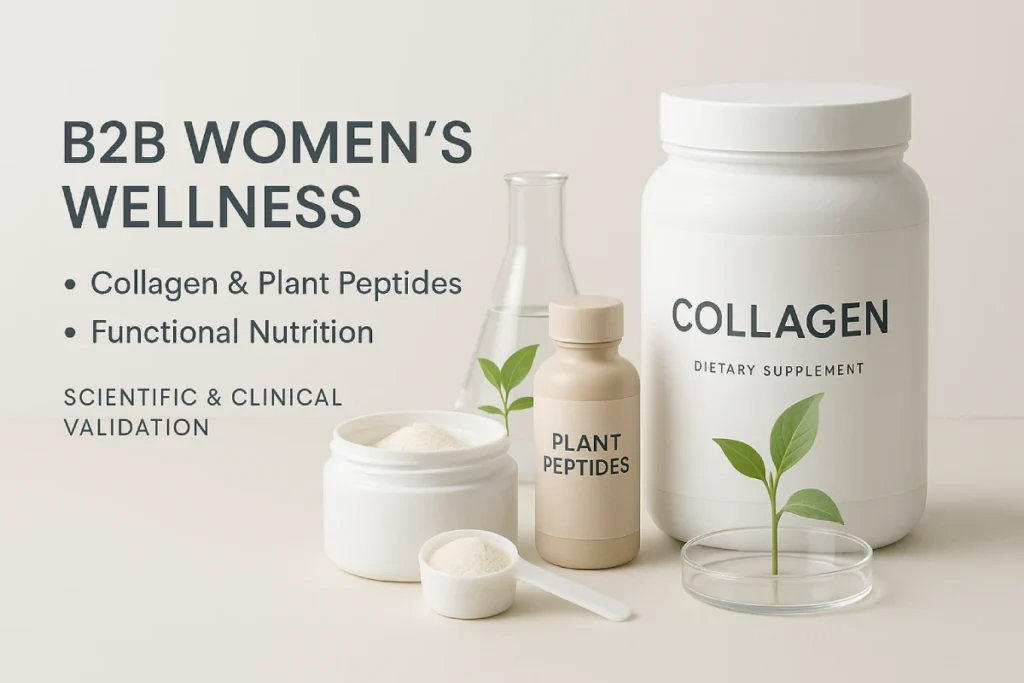
Peptide Applications in Women’s Health
Skin Health and Anti-Aging
One of the most established applications of peptides in women’s wellness is skin health. Collagen peptides, particularly hydrolyzed collagen tripeptides, are widely recognized for improving skin elasticity, hydration, and firmness. Clinical studies indicate that daily supplementation with collagen peptides can reduce wrinkle depth and promote dermal collagen synthesis ([3]). For B2B brands, integrating high-purity collagen peptides into cosmetic nutraceuticals or functional beverages provides a compelling value proposition for consumers seeking scientifically validated anti-aging solutions.
Plant-derived peptides, such as soy and pea peptides, also offer anti-aging benefits through antioxidant and anti-inflammatory mechanisms. They can neutralize free radicals, reduce oxidative stress, and support skin barrier function. PEPDOO®’s advanced enzymatic hydrolysis and fermentation processes ensure high bioactivity of plant peptides, enabling B2B brands to formulate evidence-based plant-based skincare supplements.
Weight Management and Metabolic Support
Peptides extend beyond skin applications, with metabolic health representing another significant opportunity. GLP-1 analog peptides and bioactive small-molecule peptides have been shown to modulate appetite, support glucose regulation, and promote fat metabolism ([4]). For women in perimenopause or menopause, these peptides can be incorporated into functional nutrition products to address weight gain and metabolic imbalances associated with hormonal shifts.
B2B brands can leverage customized peptide formulations from PEPDOO® to develop differentiated products targeting weight management. By combining animal-derived and plant-based peptides, PEPDOO® enables precise control over molecular weight and bioactivity, aligning with regulatory compliance and scientific efficacy.
Hormonal Balance and Emotional Well-Being
Emerging research highlights peptides’ role in hormonal regulation and emotional support. Oxytocin-derived peptides and specific small-molecule peptides influence mood, stress response, and reproductive hormone balance. B2B brands developing women’s wellness supplements for mood stabilization, stress reduction, or sexual health can benefit from PEPDOO®’s bioactive peptide solutions, which have been validated for efficacy in functional nutrition formulations ([5]).
Cognitive Function and Sleep Quality
Certain peptides show promise in cognitive enhancement and sleep support. By modulating neurotransmitter activity and supporting neuroprotective pathways, peptides can help mitigate age-related cognitive decline and improve sleep quality. For B2B brands, integrating these peptides into functional beverages or medical nutrition products creates a strong differentiation point, particularly for wellness-conscious female consumers.
PEPDOO®: A Trusted Partner in Peptide Innovation for B2B Brands
For B2B brands aiming to innovate in women’s wellness, partnering with a reliable peptide manufacturer is essential. PEPDOO® offers a comprehensive solution, combining full-range peptide production capabilities, extensive patent portfolio, and industry-standard setting authority in China. With over a decade of expertise, PEPDOO® enables B2B clients to access high-purity collagen peptides, plant peptides, elastin peptides, and bioactive small-molecule peptides, all produced under stringent quality and regulatory compliance standards ([1]).
Customization and Product Development
One of PEPDOO®’s key advantages is its ability to deliver custom peptide solutions tailored to specific B2B requirements. Brands can request peptides with precise molecular weight distributions, amino acid profiles, or functional characteristics to match product positioning, regulatory needs, and consumer expectations. For example, a nutraceutical brand targeting skin anti-aging can combine hydrolyzed collagen tripeptides with antioxidant plant peptides to enhance efficacy and differentiate its offering.
By leveraging OEM/ODM services, PEPDOO® helps B2B partners accelerate time-to-market while maintaining scientific credibility. This is particularly valuable in the competitive women’s wellness segment, where market differentiation and evidence-based claims are critical for consumer trust ([2]).
Scientific Validation and Market Differentiation
B2B brands benefit from PEPDOO®’s robust research and clinical validation portfolio. Studies on collagen peptides demonstrate improvements in skin elasticity and hydration ([3]), while plant-derived peptides show antioxidant and metabolic benefits ([4]). By integrating such scientifically validated ingredients, B2B brands can strengthen marketing claims, enhance brand reputation, and meet the increasing demand for functional nutrition products supported by data.
Furthermore, PEPDOO®’s expertise in small-molecule peptide design allows brands to explore emerging applications such as hormonal balance, emotional support, and cognitive wellness. These innovations enable B2B brands to address niche but high-growth markets within women’s health.
Regulatory Compliance and Global Reach
Navigating the regulatory landscape is a major challenge for B2B brands in functional nutrition. PEPDOO® maintains strict adherence to international standards, including ISO certifications and GMP-compliant production processes. This ensures that all peptides are safe, traceable, and compliant with regional labeling and health claim regulations.
With a global distribution network and technical support teams, PEPDOO® empowers B2B partners to launch peptide-based products internationally, maintaining consistency in quality and efficacy, and enabling brands to scale efficiently while meeting diverse regulatory requirements.
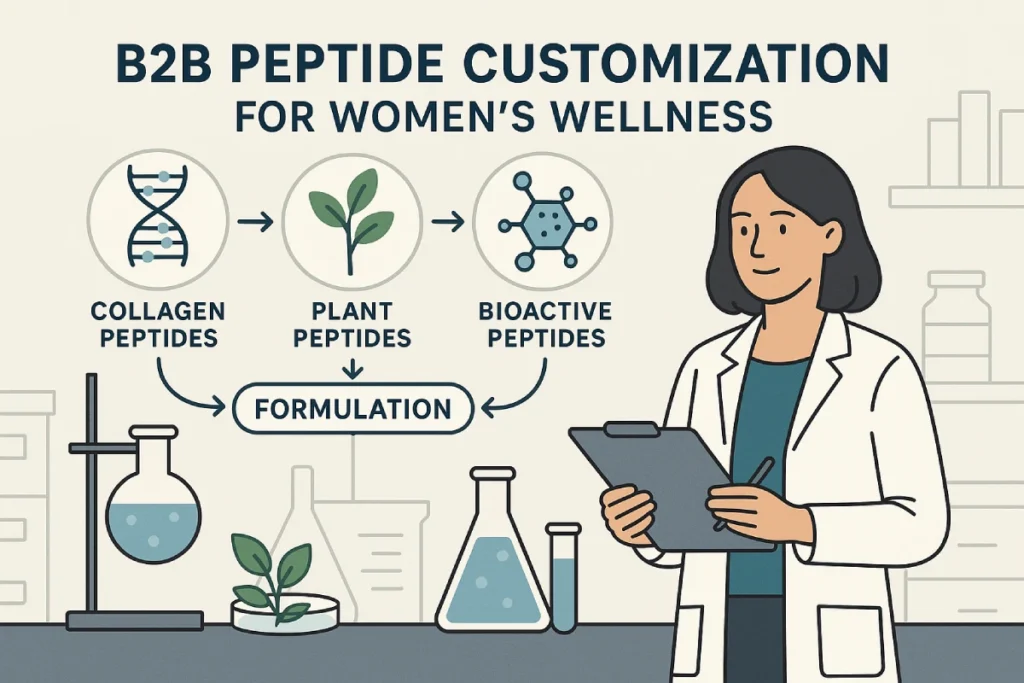
Market Trends and Future Outlook in Women’s Wellness Peptides
The functional nutrition market for women is evolving rapidly, with increasing demand for personalized, science-backed wellness solutions. Consumers are seeking products that not only address visible concerns such as skin aging but also systemic health issues, including metabolic balance, hormonal regulation, and cognitive support. This trend is driving B2B brands to innovate with peptides that offer multi-functional benefits, measurable efficacy, and clean-label appeal ([1]).
Emerging peptide technologies are enabling next-generation functional nutrition formulations. For example, collagen tripeptides continue to dominate the anti-aging segment, while plant-derived peptides are gaining traction for their antioxidant and anti-inflammatory properties. Additionally, small-molecule bioactive peptides are unlocking opportunities in mood regulation, hormonal balance, and sleep support, providing differentiated solutions for women’s wellness ([2]).
PEPDOO®’s Role in Driving Innovation
PEPDOO® plays a pivotal role in helping B2B partners leverage these market trends. As a full-range peptide manufacturer and industry standard-setter in China, PEPDOO® provides advanced peptide solutions tailored to diverse applications. Our proprietary enzymatic hydrolysis, fermentation, and precision fractionation technologies allow the production of peptides with specific molecular weight distributions and functional activities, supporting customized product development for B2B clients.
Furthermore, PEPDOO®’s extensive patent portfolio in small-molecule peptides and adherence to international GMP and ISO standards ensure that partners receive high-quality, scientifically validated ingredients. This enables brands to differentiate their products, meet regulatory requirements, and confidently promote health claims in international markets ([3]).
Conclusion: Embracing Peptide Innovation for Strategic Growth
For B2B brands in the functional nutrition and women’s wellness sectors, peptides represent a high-potential avenue for innovation and market expansion. By integrating bioactive peptides into their product lines, brands can address a spectrum of consumer needs, from skin health and metabolic support to emotional well-being and cognitive performance.
Partnering with PEPDOO® equips B2B companies with comprehensive peptide solutions, technical expertise, and market insights to create scientifically credible, differentiated, and scalable products. As consumer demand for functional, evidence-based nutrition grows, embracing peptide innovations positions brands at the forefront of the rapidly expanding women’s wellness market, driving sustainable growth and long-term success.
Partner with PEPDOO® for Innovative Peptide Solutions
Unlock full-range peptide solutions tailored for women’s wellness. Leverage our expertise in collagen, plant, and bioactive peptides to create scientifically validated, high-efficacy products that differentiate your brand in the functional nutrition market.
Explore Our Peptide PortfolioFAQ
A: For B2B brands, peptides can be categorized based on functionality:
- Collagen peptides: Support skin elasticity, hydration, and joint health.
- Plant-derived peptides (soy, pea, rice): Offer antioxidant, anti-inflammatory, and metabolic benefits.
- Small-molecule bioactive peptides: Target hormonal balance, mood regulation, cognitive support, and sleep quality.
Choosing the right type depends on product goals, target demographics, and formulation requirements. PEPDOO® can provide detailed guidance based on clinical evidence and molecular profiling.
A: PEPDOO® offers OEM/ODM services that include:
- Customized peptide blends with precise molecular weight and bioactivity
- Tailored amino acid profiles for specific health functions
- Formulation support for functional beverages, supplements, and medical foods
- Regulatory compliance guidance for international markets
This enables B2B partners to launch differentiated products quickly, with scientifically validated efficacy.
A: Yes. PEPDOO® collaborates with research institutions to validate the functional benefits of its peptides. Examples include:
- Collagen tripeptides for skin elasticity and wrinkle reduction
- Plant peptides for antioxidant and metabolic support
- Small-molecule peptides for hormonal balance and mood regulation
B2B brands can leverage this scientific data in marketing, labeling, and regulatory submissions.
A: Absolutely. PEPDOO® provides both animal-derived and plant-derived peptides, allowing brands to formulate:
- Vegan-friendly or plant-based products
- Gluten-free, lactose-free, and allergen-controlled options
- Clean-label products that appeal to health-conscious consumers
This flexibility is ideal for B2B brands targeting diverse international markets.
A: All PEPDOO® peptides are manufactured under:
- GMP-compliant facilities
- ISO-certified production processes
- Full traceability and quality control
These standards help B2B brands meet regulatory requirements in markets including the EU, US, and Asia, ensuring safe and compliant functional nutrition products.
A: Peptides allow B2B brands to:
- Develop scientifically validated, high-efficacy products
- Target niche functional areas (anti-aging, metabolic support, hormonal balance)
- Combine multiple peptides for multi-functional formulations
- Communicate credible health claims supported by research
Partnering with a reputable peptide manufacturer like PEPDOO® ensures consistent quality and innovation advantage.
A: Current trends include:
- Demand for personalized and multi-functional nutrition
- Preference for evidence-based ingredients
- Rising interest in plant-based and clean-label products
- Growing market for anti-aging, cognitive, and metabolic health supplements
B2B brands that adopt peptide innovations early can gain a competitive edge and capture high-value consumer segments.
References (APA Format)
- Grand View Research. (2025). Women’s Health Therapeutics Market Size, Share & Trends Analysis Report By Application (Contraceptives, Hormonal Replacement Therapy, Menopause), By Region, And Segment Forecasts, 2025 – 2034.
- FemHealth Insights. (2024). Peptides in Women’s Health: Unlocking Therapeutic Potential.
- PEPDOO®. (2025). About Us. Retrieved from https://pepdoopeptides.com/about-us/
- Proksch, E., Segger, D., Degwert, J., Schunck, M., Zague, V., & Oesser, S. (2014). Oral supplementation of specific collagen peptides has beneficial effects on human skin physiology: a double-blind, placebo-controlled study. Skin Pharmacology and Physiology, 27(1), 47–55.
- Holst, J. J. (2007). The physiology of glucagon-like peptide 1. Physiological Reviews, 87(4), 1409–1439.


